The High Key Portrait Series: Pissed Jeans
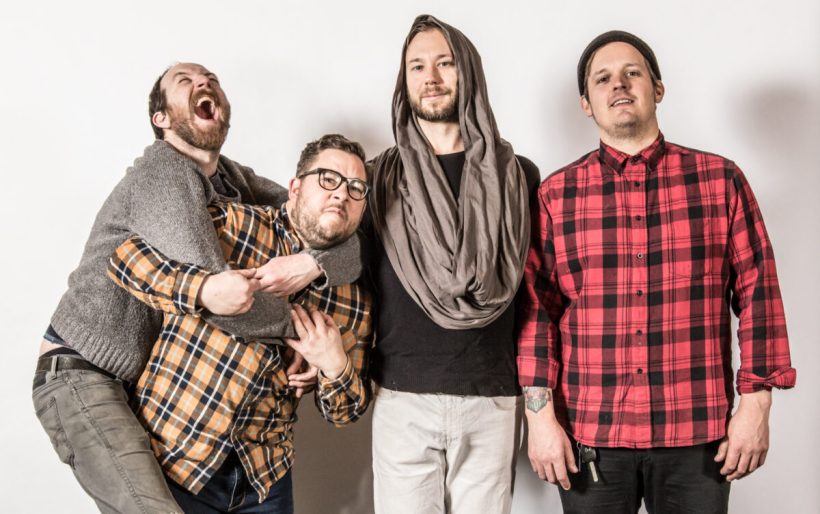
Pissed Jeans | photo by Josh Pelta-Heller for WXPN
“High Key” is a series of profiles conceived with the intent to tell the story of Philly’s diverse musical legacy by spotlighting individual artists in portrait photography, as well as with an interview focusing on the artist’s experience living, creating, and performing in this city. “High Key” will be featured in biweekly installments, as the series seeks to spotlight artists both individually and within the context of his or her respective group or artistic collective.
Pissed Jeans kicked off their record release show at Boot & Saddle last month waiting on drummer Sean McGuinness, before he finally emerged from the bar, swam his way through the wall-to-wall bodies of the sold-out house, and climbed up onto the stage.
The set is an intractable inferno, furious and urgent, demanding the rapt attention of the hundreds of fans and friends who came happy to give it, as they sweated and moshed, crowd-surfed and stage-dived, in the pious tradition of rock worship of these esteemed ministers of “sludge-punk.”
“I’m not really too concerned [with labels],” remarks frontman Matt Korvette. “That’s fine. Whatever people wanna call you, you’re stuck with.” Adds guitarist Brad Fry, “it seems very generic but yeah, it’s just rock music. But taken from all elements of rock — punk, metal, garage rock.” Fry, bassist Randy Huth, Korvette, McGuinness and I are sitting in a cramped in a “green room” — the venue’s euphemism for a basement storage closet behind the kitchen with a sofa and a lamp — in advance of their show that night. I’d later wish I’d gotten the opportunity to interview them after the show rather than before, just because I wanted to ask about why Korvette would make a demonstration that night of destroying several vinyl copies of some of my favorite Beatles albums on stage.
Why Love Now is the band’s fifth full-length album, and their fourth on Sub Pop. “It was crazy. We were shocked. Totally shocked,” remembers Korvette about being signed to the label, established in Seattle in the mid-eighties and made famous by Nirvana. The label took notice of them “organically,” to hear Korvette tell it, and having originally brought them in just for a single, their deal was broadened to include one LP, before Sub Pop decided to keep them on board for the duration. “But even doing a single was shocking,” Korvette reflects, “because we weren’t, like, looking for labels. That was never part of our thought process.” Adds the singer with a characteristically dryly delivered irony, “they just had good taste.”
On stage and off, the four of them share an obvious and genuine chemistry, the intangible pixie dust that tends to elevate a band to more than a band. They juggle families, day jobs, responsibilities and commitments, and a commute to connect with Fry, too, who doesn’t live in the immediate vicinity. But the arrangement works for them, and they see no reason to change things at this point, after almost a decade-and-a-half. “There’s no reason to really stop. We’re all friends. We’re just playing music with our friends.”
As we talk, McGuinness wanders upstairs and we wait for a few minutes for him to return before we get to the questions, but he never does. I ask if they were ok getting started without him, for now. “Yeah,” Fry replies. “He’s not that important.”
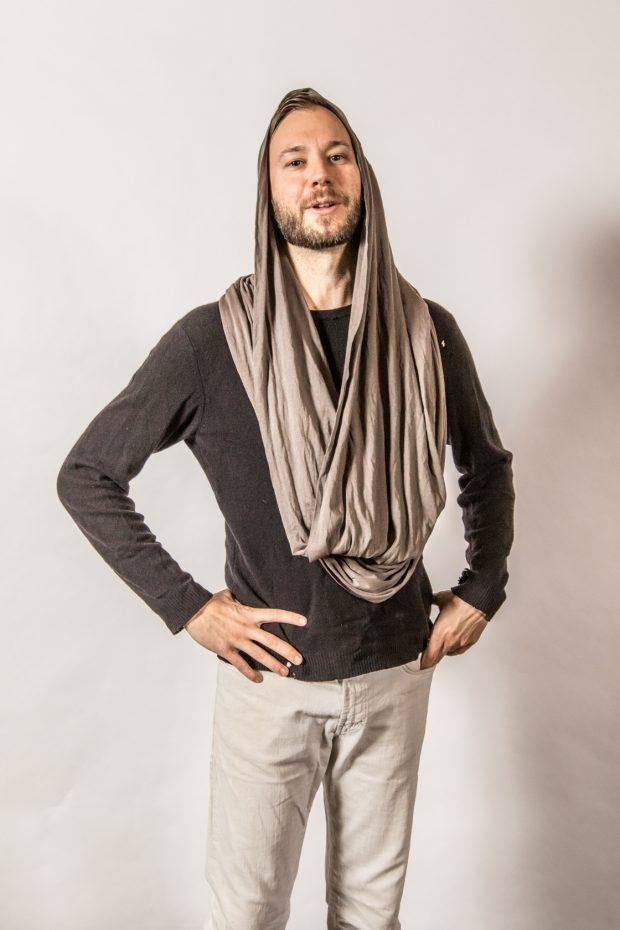
Pissed Jeans | photo by Josh Pelta-Heller for WXPN
TK: OK. So this interview is about how living in Philly informed your music.
Brad Fry: [smiles] See ya…
TK: You’re from Lehigh Valley, right?
BF: Bethlehem.
Matt Korvette: Just strike all of [Brad’s] comments. [Mocking Brad’s voice] “the streets are too skinny and there’s so much crime.. You can’t park anywhere…”
TK: You guys are all originally from up there, right?
Pissed Jeans [in unison]: Roughly.
TK: But you’re down here now.
MK: [Brad’s] from Bethlehem, the other three of us have been down [in Philly] now for a decade.
Randy Huth: Sean’s from Ardmore.
TK: What do you first remember from your first shows in Philly, what it was like to be on stage as a band? Were you nervous, were you well-received?
Randy Huth: I guess we played the Khyber, right?
MK: Great little skinny room. Awkward to get into.
TK: We’re talking ten years ago?
MK: Probably like ten, eight, nine, seven years ago. We played Silk City, that was good. That might’ve been our first Philadelphia show, Silk City. We played a random spot with Black Dice, in Northern Liberties or something.
RH: Warehouse bookshop..
MK: Yeah what was that one warehouse in Fishtown or Kensington, remember that one?
BF: Yeah it was a whole space, what was that called…
MK: We played a bunch of different spots. It’s always been good, yeah.
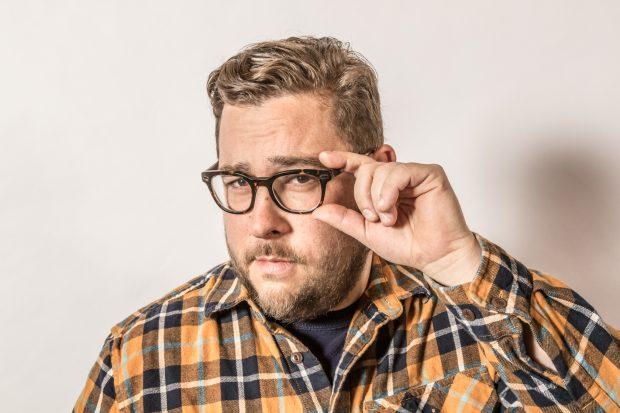
Pissed Jeans | photo by Josh Pelta-Heller for WXPN
TK: Did you feel like outsiders, when you first came down from the Lehigh Valley to be a part of the Philly community?
MK: No, not really, I mean, I guess we felt a kinship with whoever else was playing noisey, punk-type music. I think there wasn’t a whole lot of bands like us at the time, and so the ones that were like us we just felt connected with. That was my kinda feeling. There wasn’t enough of us to feel competitive, or like we were takin’ up too much space or somethin’, you know?
TK: What do you guys love most about the Philly arts scene in general?
MK: Probably just how there’s just a lot of options to choose from. This isn’t the spot where there’s only like one club in town, it’s not like there’s one basement or one big theater. There’s like a million venues. Just from like us playing a record release show, we had like so many options to think about, you know?
TK: Why Boot & Saddle?
MK: We’d never played here before. I like coming to shows here. We thought about doing a couple of smaller shows rather than one larger venue. And I was able to walk here, you know? That’s pretty nice. You could probably walk here too, right [Randy]?
RH: Yeah, I live a couple blocks down the street.
TK: Do you guys have a favorite Philly venue?
MK: My gut reaction is Johnny Brenda’s, but I don’t know. It’s not always the most fun there.
TK: It’s not?
MK: No, I mean, but that’s the first one that came to my mind.
RH: Yeah, me too.
MK: It feels a little bit like home, going to see a show there.
TK: A lot of people say that.
RH: Yeah there’s nothing wrong with it, by any means. We played there so many times, it feels like.
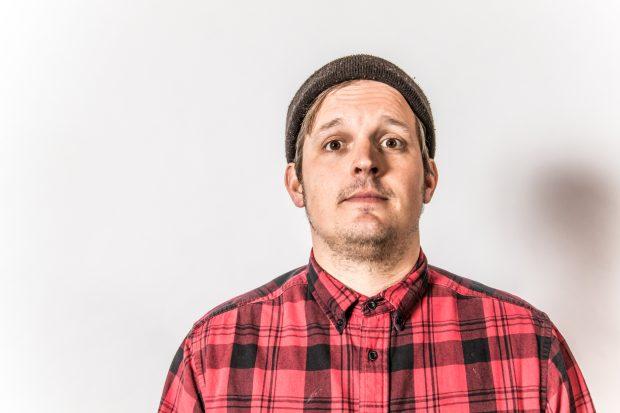
Pissed Jeans | photo by Josh Pelta-Heller for WXPN
TK: Is there anything you guys think of as frustrating about the Philly arts scene?
MK: I guess if anything, it’s a very comfortable place to be, so maybe people aren’t pushing themselves as much. It’s not like as do-or-die, you know, you’re not paying like $2000-a-month rent to live here. So you can kind of just casually be a band, not really put in a whole lot of effort. We’re kind of a little guilty of that, you know. It’s nice when there’s maybe a little pressure for people to be like, ‘we have to be the absolute best at what we’re doing, ‘cause it’s so precious.’
TK: From a technical point of view, or execution?
MK: From like an artistic point of view I guess.
TK: So you would feel more hungry, you mean.
MK: It’s just so easy here, you know? And I’m not sure that ease is the best situation for great art. Although it’s nice.
TK: You mean easy to make a living as an artist.
MK: Yeah yeah, like you know, this isn’t like DC, where you’re either like a suit, or you’re like living in poverty. There’s like plenty of ways to get by here. That’s why so many people are moving here.
TK: Do you have a favorite Philly artist, or maybe a Philly artist that influenced you the most?
MK: Excelsior.
BF: Wow. That’s a good one.
MK: Yeah they broke up awhile ago, but yeah they were a sick band. A few of those guys are still around, friends of ours.
RH: That’s a record we loved before anyone moved here.
MK: Yeah I wouldn’t see that we really sound like them, but they were a huge influence.
TK: When you first heard of them, was it sort of as a fellow local band?
MK: I think through a friend who put out their record.
RH:: Yeah, same label that we were on put out their record.
MK: …seventeen years ago… [laughs]
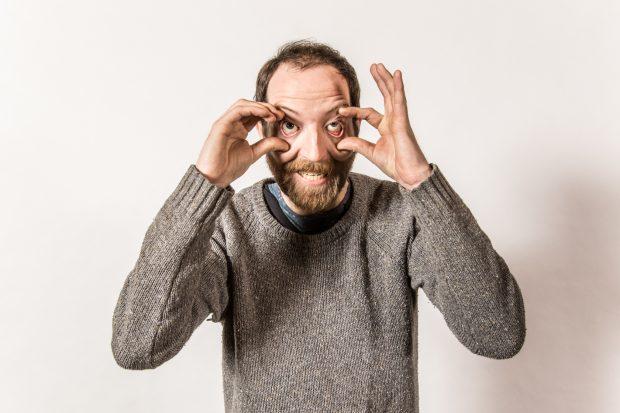
Pissed Jeans | photo by Josh Pelta-Heller for WXPN
TK: Which neighborhoods have you guys lived in, in Philly?
MK: Queen Village, South Philly.
RH: I live in South Philly. They call it Newbold, it’s probably Point Breeze, really. I’ve always lived basically in South Philly. When I first moved here I lived on South Street, right above the record store, Spaceboy.
MK: I lived in Fishtown, on Girard. I loved it.
TK: How have you guys seen the city change, in any particular ways?
MK: I think it got busier, more nightlife, stuff going on. I dunno. More restaurants, better food.
TK: So you think it’s gotten better, in general?
RH: Depends what “better” is, but there’s definitely more options to eat, and there’s more people buying houses. And there’s more places to drink beer.
- Pissed Jeans | photo by Josh Pelta-Heller for WXPN
- Pissed Jeans | photo by Josh Pelta-Heller for WXPN
- Pissed Jeans | photo by Josh Pelta-Heller for WXPN
- Pissed Jeans | photo by Josh Pelta-Heller for WXPN
- Pissed Jeans | photo by Josh Pelta-Heller for WXPN
- Pissed Jeans | photo by Josh Pelta-Heller for WXPN
- Pissed Jeans | photo by Josh Pelta-Heller for WXPN
- Pissed Jeans | photo by Josh Pelta-Heller for WXPN
- Pissed Jeans | photo by Josh Pelta-Heller for WXPN
- Pissed Jeans | photo by Josh Pelta-Heller for WXPN
- Pissed Jeans | photo by Josh Pelta-Heller for WXPN
- Pissed Jeans | photo by Josh Pelta-Heller for WXPN
- Pissed Jeans | photo by Josh Pelta-Heller for WXPN
- Pissed Jeans | photo by Josh Pelta-Heller for WXPN
- Pissed Jeans | photo by Josh Pelta-Heller for WXPN
- Pissed Jeans | photo by Josh Pelta-Heller for WXPN
- Pissed Jeans | photo by Josh Pelta-Heller for WXPN
- Pissed Jeans | photo by Josh Pelta-Heller for WXPN
- Pissed Jeans | photo by Josh Pelta-Heller for WXPN
- Pissed Jeans | photo by Josh Pelta-Heller for WXPN
- Pissed Jeans | photo by Josh Pelta-Heller for WXPN
- Pissed Jeans | photo by Josh Pelta-Heller for WXPN
- Pissed Jeans | photo by Josh Pelta-Heller for WXPN
- Pissed Jeans | photo by Josh Pelta-Heller for WXPN
- Pissed Jeans | photo by Josh Pelta-Heller for WXPN
- Pissed Jeans | photo by Josh Pelta-Heller for WXPN
- Pissed Jeans | photo by Josh Pelta-Heller for WXPN
- Pissed Jeans | photo by Josh Pelta-Heller for WXPN
- Pissed Jeans | photo by Josh Pelta-Heller for WXPN
- Pissed Jeans | photo by Josh Pelta-Heller for WXPN
- Pissed Jeans | photo by Josh Pelta-Heller for WXPN
- Pissed Jeans | photo by Josh Pelta-Heller for WXPN
- Pissed Jeans | photo by Josh Pelta-Heller for WXPN
- Pissed Jeans | photo by Josh Pelta-Heller for WXPN
- Pissed Jeans | photo by Josh Pelta-Heller for WXPN
- Pissed Jeans | photo by Josh Pelta-Heller for WXPN
- Pissed Jeans | photo by Josh Pelta-Heller for WXPN
- Pissed Jeans | photo by Josh Pelta-Heller for WXPN
- Pissed Jeans | photo by Josh Pelta-Heller for WXPN






































